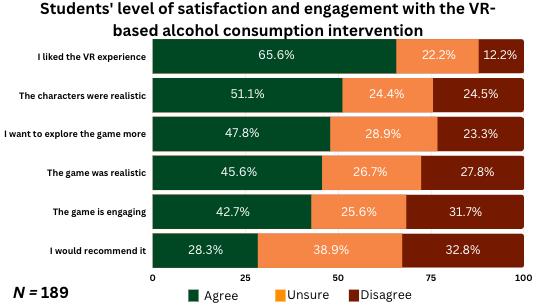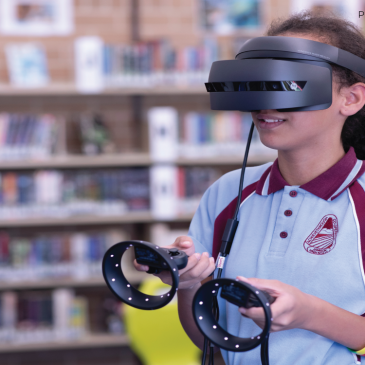Virtual reality (VR) technologies allow users to immerse themselves within a computer generated environment that feels realistic. VR technologies have significant potential to encourage behavioral change, with studies finding that VR simulations promote learning about climate change, reduce Covid-19 vaccine hesitancy, and help children manage pain and anxiety. Because VR technologies have only recently been developed, little research has evaluated users’ perceptions of VR and whether this technology is an acceptable way to deliver educational information. This week, The DRAM reviews a study by Julie Dalgaard Guldager and colleagues that investigated Danish adolescents’ perceptions of a VR alcohol prevention program. Their study explored whether adolescents are receptive to using VR technologies and whether their perceptions varied by sociodemographic characteristics such as race and age.
What were the research questions?
What do Danish students think about a VR alcohol prevention intervention? Do different sociodemographic factors influence what students think about the VR alcohol prevention intervention?
What did the researchers do?
The researchers conducted a clustered randomized controlled trial in which schools were recruited and then randomly assigned to different experimental conditions. Students in schools either went through the alcohol prevention intervention or were placed into a control group where they played a separate VR-based game. Throughout the alcohol intervention simulation, students were presented with a virtual party experience in which they navigate different party scenarios and are offered different alcohol and non-alcoholic drinks. The researchers recruited seven schools based in southern Denmark. In total, the researchers recruited 181 students, with ages between 14 and 18.
What did they find?
Generally, students reported either neutral or favorable opinions about the VR-based alcohol prevention intervention (see Figure). The researchers controlled for participants’ sex, age, familial affluence, drinking history, norms related to drinking, school performance, and mental well being to see whether these factors influenced receptivity. None of these factors influenced students’ perceptions of the intervention.

Figure. This figure depicts the frequencies that students stated they disagreed with, were unsure about, or agreed with statements pertaining to the VR-based alcohol consumption intervention. Click image to enlarge.
Why do these findings matter?
Overall, these findings suggest that Danish adolescents view VR-based alcohol consumption interventions positively (see Figure). This finding is significant because it means that students are receptive to VR-based interventions, which could lower their resistance to receiving health information. The findings also suggest that VR-based interventions may be appropriate for a wide audience of adolescents. For these reasons, it may be worthwhile for researchers and practitioners to explore using VR as a tool to promote adolescents’ alcohol refusal skills.
Every study has limitations. What are the limitations in this study?
While the study found that students enjoyed the VR intervention overall, the researchers did not assess its impact on students’ drinking refusal skills or their desire to drink. Another limitation of the study was that the participant pool was limited to southern Denmark. Consequently, more research is needed to understand whether adolescents from other countries, or people in other age groups, view VR-based alcohol consumption interventions favorably.
For more information:
The National Institute on Alcohol Abuse and Alcoholism has tips and resources for people struggling with problem drinking. For additional drinking self-help tools, please visit our Addiction Resources page.
— Seth McCullock, PhD
What do you think? Please use the comment link below to provide feedback on this article.




